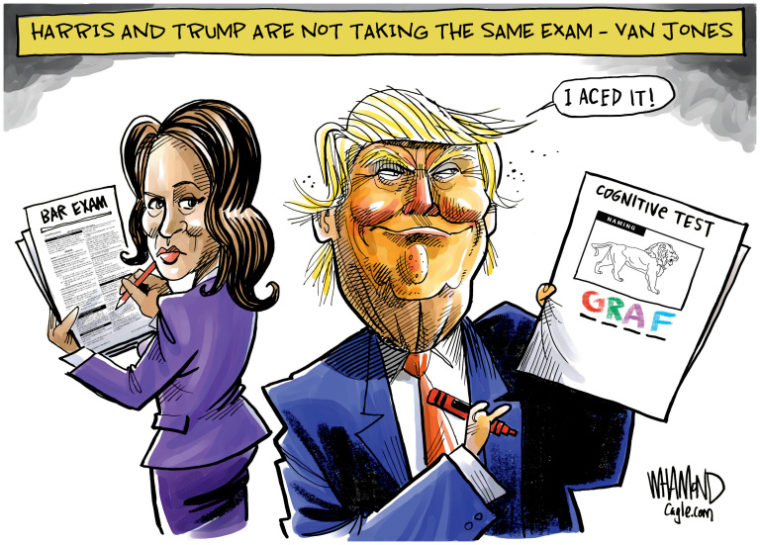
by Molly Bowman-Styles
The mainstream corporate media’s mansplaining of Vice President Kamala Harris has begun.
First out of the starting gate: 60 Minutes Correspondent Bill Whitaker, whose prime-time interview with the Democratic Party’s presidential nominee set the pace of the pile-on to come.
During their 20-minute discussion, Whitaker interrupted Harris eight times, questioned her ability to deploy her personal firearm, and inserted his decades of immigration reporting experience into her explanation of the Biden-Harris Administration’s immigration record, including its full-throated support of a comprehensive immigration reform bill that ultimately was torpedoed by her Republican opponent, Donald Trump.
Turning to the economy, Whitaker’s condescension continued: He blamed Harris for the disconnect between the Biden-Harris Administration’s “envy of the world” economy and lackluster American consumer sentiment. When Harris began outlining her proposal to work with Congress to tackle the scourge of consumer price gouging on food and groceries, segment producers cut her off midsentence, summing up her proposal as “unrealistic” and “undefined. “
Moments later, Whitaker interrupted Harris again. This time, as she began outlining the pillars of her 82-page economic plan — providing parents with a childcare tax credit and offering tax breaks to first-time home buyers and Americans starting small businesses — and, given the opportunity to complete her answer, how she would tackle her plan’s projected $3 trillion price tag.
“Pardon me, Madam Vice President. The question was how are you going to pay for it?” Whitaker interjected. Harris didn’t skip a beat. Defending her plan as an investment in America’s middle class that would result in a stronger economy for all Americans, Harris asserted she would pay for her plan by making sure “the richest among us — who can afford it — pay their fair share in taxes.”
Whitaker persisted. “This is the real world,” he schooled her. “How are you going to get this through Congress?”
So much for the Harris-Walz campaign’s message of hope and joy.
Lifting Whitaker’s beltway cynicism to higher ground, Harris’ retort extolled the political power harnessed by America’s frontline workers — including firefighters, teachers, and nurses — when they stand together and advocate for policies that expand the economy from the middle out and the bottom up. She made sure to have the last word on the subject, introducing herself to the 25% of the Americans, who don’t know who she is or what she stands for, as a “devout public servant … and a capitalist” who “understands the limitations of government.”
Take your victory lap, Madame Vice President!
Next up: The Washington Post’s morning-after analysis of the interview. The format — a discussion between reporters Charles Lane, Ramesh Ponnuru, and Stephen Stromberg — projected a locker room vibe of shoot-from-the-hip commentary and unremarkable observations.
When Chase asked Lane to share his impression of Harris’ presentation, Lane replied: “Someone who sticks to her talking points.” Spoken against the backdrop of Trump’s campaign trail tirade of denigrating comments about his opponent — including calling Harris “stupid,” “dumb as a rock,” and “lazy” — Lane’s careless remark left the false impression that Harris came across as robotic during her prime-time debut as the Democratic presidential nominee.
The idea of Harris as unprepared and uninspired to shoulder the responsibilities of the United States of America’s commander-in-chief and the leader of the free world gained traction when Lane described her’ “sure-footed” foreign policy responses as “formulaic,” which Ponnuru attributed to “studying her lines more avidly.”
Ponnuru also described the Vice President as more evasive than most politicians when answering questions, arguing she “has not mastered the art of hiding when she does it.” Lost on Ponnuru: Most politicians avoid the appearance of hiding something — a form of deception — at all costs. Trump is the exception to this rule, which most likely is the reason Ponnuru made his point in the first place.
Although Trump backed out of his prime-time 60 Minutes interview, breaking with a 56- year presidential election-year tradition, this confab of good-old-boy beltway pundits couldn’t resist his gravitational pull. Time and again, their opinions and observations circled back to the man who skulked away from his turn in the 60 Minutes hot seat, as if Harris were a bit player in her own interview.
Mansplaining assumes women have no knowledge of a subject. It surfaced again when the three reporters pivoted from the task at hand — offering their analysis of Harris’ interview presentation — to telling her how to run her presidential campaign. They pulled their unsolicited ideas from, you guessed it, Trump’s political campaign playbook.
“She needs a catchy policy idea,” Lane volunteered. “Something succinct as ‘build the wall’ but responsible and relevant.” Stating the obvious, Lane urged Harris to “spend every moment she can spare in Michigan, Wisconsin, and Pennsylvania.” Because symbolism trumps substance in a man’s world, Lane added for good measure: “She needs to get out there and show the flag. Motivate people.”
When The Atlantic Monthly endorsed Abraham Lincoln for the presidency in 1860, Poet James Russell Lowell wrote: “In a democracy, it is the duty of every citizen to think.”
Here’s to thinking — and voting — by our own lights in this pivotal presidential election.
A second-generation San Diegan and nonprofit consultant, Molly Bowman-Styles is the President of Windansea Communications. Republished from The Times of San Diego which, along with The Moderate Voice, is a member of the San Diego Online News Association.
















